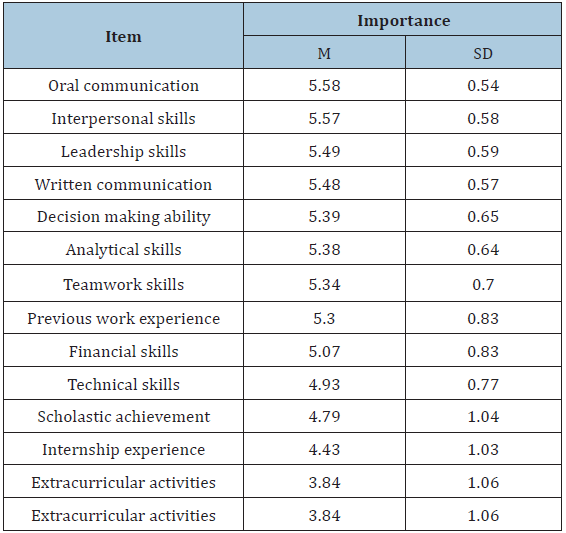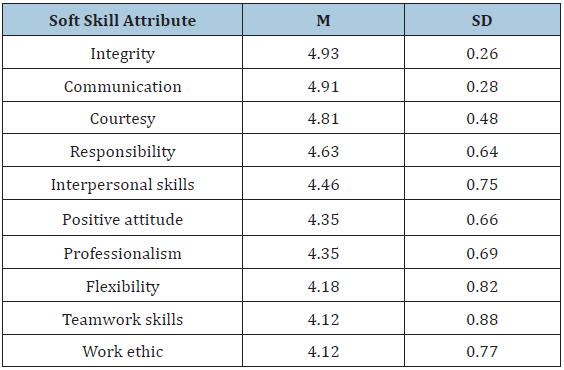- Submissions

Full Text
Strategies in Accounting and Management
Managing with Social Responsibility: Reflection
Orlando Petiz Pereira*
Economics and Management School, University of Minho, Portugal
*Corresponding author: Orlando Petiz Pereira, Economics and Management School, University of Minho, Portugal
Submission: February 24, 2020; Published: March 02, 2020

ISSN:2770-6648Volume1 Issue3
Abstract
Managing responsibly is one of the concerns of current economic agents, both as a group and individually. Nonetheless, the employees' lack of holistic skills is an obstacle to the implementation of corporate/business cultures targeted at those objectives. Its absence hinders the experience in environments of harmony, respect, tolerance, social responsibility and commitment. As these values are deemed rather strategic in the performance and competitiveness of companies, we should discuss at length and in-depth the importance of University-Company interaction for the training of new citizens for the construction of a more attractive, friendly and dignified society.
Keywords: Holistic skills; Managing responsibly; Spiritual capital; Social responsibility
Introduction
Managing responsibly is one of the concerns of today's society. All economic actors are concerned and are speaking about his matter on a daily basis. Employers feel conditioned with the skills’ gap their employees outshine and consider that this hinders back better performance and greater commitment from the employee. For their part, employees are still unaware of the existence of holistic skills, which are different from traditional skills, and which boost and enhance sustainability to personal and company performances. As this unawareness is common in employers and employees, it is urgent to reflect on the organizational behaviour construct, because companies, regardless of their sector of activity, aim at reducing absenteeism and stimulating motivation and responsibility in their employees and stakeholders. The question is, are these organizations built on a culture of inclusion and respect for "the other" and towards society? Can individuals, personally and professionally, envision a meaning and purpose for what they do, how do they do, who they do with and who they do to? Will there not be a lack of spiritual capital in business environments that hinders processes aimed at balancing the employee and the company? Is not this spiritual deficit preventing professional and social performances of excellence? And the leaders of these companies, are they giving good examples of experience and guidance for the spiritual capital, as a way to leverage responsibility in performance and produce harmony in relationships? Spirituality produces productivity gains through the alignment of behaviors and other potential workplace benefits [1]. In this regard, although focused on a specific window of productive activity that is nursing, Elkins & Cavendish [2] consider that spirituality is private since its output is a "care". In addition, they say that it is urgent to promote spiritual intelligence amongst nurses, as a profession, so that these professionals can improve their performance and witness the well-being of people/patient. However, this reality is inherent in all activities, regardless of whether the scientific field of the employee is in health, education, economics, business, social sciences, computational science, life sciences, inter alia. Underlying this reality are the skills that structure productivity and that gives greater longevity to corporate competitiveness.
In this sense, companies continue to seek after training, with the aim of enhancing their internal skills in line with the sense of responsibility rationale. However, according to Eberhardt, Moser & McGee [3], companies continue to value Master Business Administration (MBA) programs, when their concern should be more focused on the areas of leadership training, oral and written communication and interpersonal skills. Those authors do also consider that MBA courses should: (i) make a greater connection between companies and universities so that they are more attentive to the needs of the companies, (ii) pay attention to the field of management that is very comprehensive and different, (iii) focus on group and non-individual values, (iv) hold less theoretical academic curriculum and a greater applicability orientation, (v) develop the soft skills necessary for a manager, (vi) have a body of teachers possessing a more appropriate training to the professional practice of management. In the same line of thought, Rubin & Deardorff [4] are also in favor of bringing higher education courses to the real world because society needs new citizens who know how to escape from their emotional winter, their depressed mood and the pain of depression of emotional misery that rages among people Cury [5]. The empirical work conducted by Eberhardt, Moser & McGee [3], through a questionnaire to human resources department heads, summarises the most relevant factors for the decision when recruiting MBA students are the soft skills and not hard skills, according to Table 1.
Table 1: Importance of various factors in hiring of MBA students.

Source: Eberhardt, Moser & McGee [3].
These results underline that, nowadays, the real-world privileges training focused on soft skills [6-9]. They seek employees holding technical skills in the area of training, but also with strong skills and personal attributes, considering them important in the execution of tasks Robles [10]. In the same sense, Robles [10] considers that the ten soft skills most perceived as important by business executives are: integrity, communication, courtesy, responsibility, social skills, positive attitudes, professionalism, flexibility, group work and work ethics. These conclusions are based on a study of junior executives who participated in two courses. Its results are not surprising as they reinforce the importance of soft skills, according to Table 2. In this global economy, soft skills are non-tangible, non-technical and non-specific skills, yet they determine productivity, the charisma of the employee and become their strengths Robles [9-11]. Therefore, soft skills go far beyond interpersonal skills and are tangible at the level of character, attitudes, traits, behaviors and responsibility of the worker. Similarly, John [11] finds statistically significant results to validate the relevance of soft skills in the performance of a function, namely at the level of communication skills, honesty, teamwork, skills to perform work under pressure, time management skills and skills to take risks. Podeschi [12] shares the same feeling and states that the 10 skills which are most sought after by employers are:
Table 2: Mean and standard deviation of each soft skill attribute relative to perceived level of importance (N = 57).

Fonte: Robles [10].
- Ability to work in a team structure
- Ability to make decisions and solve problems (tie)
- Ability to communicate verbally with people inside and outside the organization
- Ability to plan, organize, and prioritize work
- Ability to obtain and process information
- Ability to analyze quantitative data
- Technical knowledge related to the job
- Proficiency with computer software programs
- Ability to create and/or edit written reports
- Ability to sell and influence others
Given the typology of the skills sought after and which are rather scarce within companies, what remains to do inside and/or outside companies, to produce them? What will be the contribution of teaching to this matter? Is graduate and graduate education sensitive to management with responsibility and with social responsibility? Is this teaching preparing students for self-criticism and reflective analysis of the gaps of the "new" skills offered and sought after? These questions may be addressed in the structural change of mission and objectives, both teaching and companies. Both institutions are co-responsible for the identified situation. Therefore, innovating the academic curriculum, with the participation of companies Pereira & Costa [7,8]; [13-15], can be an input to balance the demand and offer of such skills and inspire charm and more responsibility within companies. This relationship contributes to sensitize, raise awareness, socialize and hold employees accountable for the exercise of functions with a service spirit, thereby producing positive externalities on all stakeholders and shareholders.
References
- Kazemipour F, Amin SM, Pourseidi B (2012) Relationship between workplace spirituality and organizational citizenship behavior among nurses through mediation of affective organizational commitment. Journal of Nursing Scholarship 44(3): 302-310.
- Elkins M, Cavendish R (2004) Developing a plan for pediatric spiritual care. Holistic Nursing Practice 18(4): 179–184.
- Eberhardt BJ, Moser S, McGee P (1997) Business concerns regarding MBA education: Effects on recruiting. Journal of Education for Business 72(5): 293-296.
- Rubin RS, Dierdorff EC (2009) How relevant is the MBA? Assessing the alignment of required curricula and required managerial competencies. Academy of Management Learning & Education 8(2): 208-224.
- Cury A (2017) Multifocal Intelligence. (2nd Edn), Editora Pergaminho, Lisbon.
- Pereira OP (2008) Education, competences and skills in an evolutionary perspective (coord), research on education economics, number 3, aede-association of education economics. Spain, pp. 209-216.
- Pereira OP, Costa C (2017) The University: an institution of co-creation and social transformation. Eastern European Business and Economics Studies Centre 3(3): 245-269.
- Pereira OP, Costa C (2017) The importance of soft skills in the university academic curriculum: the perceptions of the students in the new society of knowledge. International Journal of Business and Social Research 7(6): 25-34.
- Pereira OP, Raposo MJ (2019) Soft skills in knowledge-based economics. Marketing and Management of Innovations 1: 182-195.
- Robles MM (2012) Executive perceptions of the top 10 soft skills needed in today’s workplace. Business Communication Quarterly 75(4): 453-465.
- John J (2009) Study on the nature of impact of soft skills training programme on the soft skills development of management students. Pacific Business Review pp. 19-27.
- Podeschi RJ (2016) Building I.S. professionals through a real-world client project in a database application development course. Information Systems Education Journal (ISEDJ) 14(6): 34-40.
- Pereira OP, Costa C (2019) The service-learning and the humanization of the academic curriculum in economics. Journal of Educational Research and Reviews 7(9): 188-198.
- Pereira OP, Costa C (2019b) Service learning: benefits of another learning pedagogy. Journal of Business Management and Economic Research 3(9): 17‐33.
- Pereira OP, Costa C (2020) The service learning based education: Experiential pedagogical practice. International Journal of Commerce and Management 6(1): 24-30.
© 2020 Michael E Yampuler. This is an open access article distributed under the terms of the Creative Commons Attribution License , which permits unrestricted use, distribution, and build upon your work non-commercially.
 a Creative Commons Attribution 4.0 International License. Based on a work at www.crimsonpublishers.com.
Best viewed in
a Creative Commons Attribution 4.0 International License. Based on a work at www.crimsonpublishers.com.
Best viewed in 







.jpg)






























 Editorial Board Registrations
Editorial Board Registrations Submit your Article
Submit your Article Refer a Friend
Refer a Friend Advertise With Us
Advertise With Us
.jpg)






.jpg)














.bmp)
.jpg)
.png)
.jpg)










.jpg)






.png)

.png)



.png)






